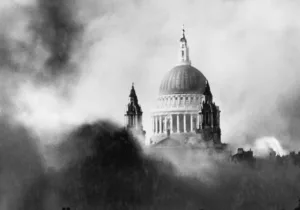Walter Russell Mead on Friday eve wonderfully spoke about the influence of eschatology on American foreign policy to our Providence/Davenant Trust/Patrick Henry College conference on security and Christian ethics. Americans even when supposedly non-religious have always projected cosmological significance onto our country’s global role, he recounted. Watch the video, which you’ll really enjoy.
I asked him if America due to this cosmic self-identity is unique in believing that our nation could collapse forever through lack of virtue. He rightly responded that other nations and empires have feared divine retribution for faithlessness. But my question was too inexact. I wondered if Americans have almost always exaggerated the role of our own current generation in shaping our national character and potentially, with a few false steps, enacting national ruin, without regard to the momentum of previous generations.
Americans often casually assume our country is so special that we have a very limited shelf life. As a boy I watched the 1980 Republican Convention when defeated candidate John Connally, a noted Texas orator, matter-of-factly noted America would inevitably fall at some point, and when it does, as a patriot he would still stand beside her. It sounded imminent and struck me as a depressing political theme. But the assumption is pervasive in our ongoing national consciousness.
Better known is the ominous warning ascribed to Benjamin Franklin while leaving the Constitutional Convention to an inquiry about the new government. “A republic, if you can keep it,” he supposedly answered. There’s little evidence he actually said it, but such tentative expectations of the supposedly precarious American nation echo across generations.
In contrast, I don’t think Russians or Chinese or Germans typically wonder if they will still exist as a people in future decades. They may endure calamity or glory, but there seems to be a permanence in their national expectations of endurance and in continuity of character, under whatever regime.
Even America’s motherland, Britain, which shares many of our Protestant eschatological historical memories, does not typically imagine its own demise as a people. Even Brexit supporters, despite their apprehensions about the EU’s grasping bureaucratic authority, didn’t really imagine that the British experience would be erased. Britain, after all, has across a millennium survived far worse that regulation from Brussels. Doubtless even if Hitler had crossed the channel, the British nation would have outlasted the Third Reich.
Americans are too overly tentative in our expectations about our future as a people. In my question to Mead, I suggested America historically identified with ancient Israel and the ancient Roman and Greek republics, fearing history would judge us eventually for our iniquities. In his response, he doubted most modern Americans could even recall those historical exemplars. True, in the precise sense, but I still think the general attitude is embedded in our national psyche.
Partly there is a certain egotism in this expectation that we ourselves can undo a trans-generational project built across centuries and actually, as an extension of British culture, at least a millennium. Do we in our own time really have such nullifying power over the momentum of a hundred previous generations?
Ronald Reagan liked to quote Thomas Paine saying, “We have it in our power to begin the world over again.” In fact, I recall his deploying the quote at the same 1980 convention where Connally spoke more darkly. But Connally and Reagan seemingly accepted the same premise that, for better or worse, the nation’s destiny was almost entirely up to us.
Christian theology perhaps counsels more modesty about our ability to reconstruct or completely undo our nation or the world. We have our sphere of influence and our moment to act. But we are always parcel to a wider constellation, temporal and spiritual. Acknowledging this reality may humble our aspirations but should be reassuring. It’s not all within our choice. And we who are the blessed beneficiaries of the Anglo-American experience are sustained by the accomplishments, sacrifice and character of previous centuries, whose trajectory, however crooked, is mostly aimed towards liberty and law.
British historian Andrew Roberts recently, on a related theme, addressed the growing international domination of the English language, which is becoming the first ever global language. It’s the primary language for the Anglosphere, from Britain and Australia, to India and Nigeria, to America and the Caribbean. But it’s the adopted second language for an even larger and growing cohort, without serious competitor.
The success of the English language is closely related to the historical progress of Anglo-American civilization. English has more words and is more versatile than any other language, reflecting its democratic and commercial adaptability. It seamlessly absorbs the best of other languages, increasing its appeal and power.
The American nation, like the English language that articulates our democracy, is organic and adaptable, not a fragile porcelain that may shatter at any moment. Exaggerated and self-absorbed fears of our demise are misplaced. We would do better to recall our origins and trajectory as we contribute towards, without presuming completely to control, our future.







 Live in the DC area? Sign-up for Providence's in-person events list!
Live in the DC area? Sign-up for Providence's in-person events list!